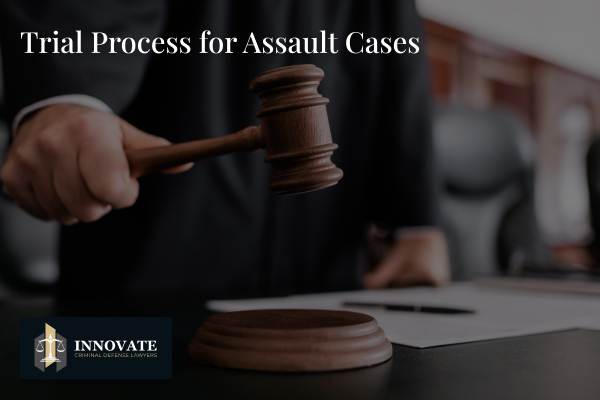
If you have been charged with criminal assault, you know how this can change your life. Charging someone with assault involves the criminal justice system, and it's not a decision to take lightly. This process can be complex and emotional for everyone involved.
Innovate Criminal Defense Lawyers can provide you with the strong defense you deserve. Having a knowledgeable criminal defense lawyer by your side can make a major difference in navigating these challenges. Learn more about when you press charges for criminal assault below. Then, contact us for a free case consultation.
Assault occurs if someone threatens physical harm to another person. It's not always about actual physical contact; even the threat of harm can qualify as assault if it puts someone in fear for their safety.
This broad definition covers numerous actions, from threatening gestures to actual attempts to inflict bodily harm. It's important to understand that the intent behind the action plays a vital role in defining an assault.
Different jurisdictions may have varying definitions of assault, but the core concept remains the same. Assault charges can escalate based on the severity of the threat or physical harm caused.
The law distinguishes between simple assault, which might involve minor threats or physical contact, and more severe forms, like aggravated assault. Knowing these distinctions is necessary for anyone involved in an assault case.
Facing assault charges can have a profound impact on your life. It can affect your personal relationships, employment opportunities, and social reputation. The stress and uncertainty of the legal process can be overwhelming. It's a situation that requires strong legal and emotional support.
Being charged with assault can also lead to a criminal record, which carries its own set of challenges. This can limit your job prospects, housing opportunities, and more.
The potential for jail time or other penalties adds another layer of seriousness to the situation. It's essential to have a clear awareness of what's at stake and to seek the help of an experienced attorney.

Once assault charges are pressed, the prosecutor will begin an investigation into the allegations. This investigation aims to gather evidence, interview witnesses, and determine the validity of the charges. The outcome of this investigation can highly influence the course of your case.
The prosecutor's decision to pursue the case depends on the strength of the evidence and the circumstances surrounding the assault.
The DA will weigh factors like the severity of the alleged harm, the credibility of the witnesses, and any previous criminal record of the accused. Being aware of how prosecutors evaluate cases can help you prepare for what's ahead.
Misdemeanor assault usually involves less serious harm or threats without the use of a weapon. The penalties might include fines, community service, or short jail sentences.
Felony assault, on the other hand, involves more serious harm or the use of a weapon and can lead to longer jail sentences and more large fines.
Knowing the difference between these two types of assault is important. It affects the legal strategy and the potential outcomes of your case. A felony charge is more severe and carries heavier penalties, including the possibility of a longer period in prison.
Pre-trial motions can highly impact the course of an assault case. They allow the defense to challenge the prosecution's evidence or argue for the case to be dismissed on legal grounds. The discovery process is equally important, allowing the sides to review the evidence and prepare their arguments.
Having knowledge of these legal procedures is necessary for anyone facing assault charges. It helps you know what to expect and how to work with your attorney to build a strong defense. A knowledgeable criminal defense lawyer can guide you through these complexities and advocate for your best interests.

The trial is a critical stage in the assault case process. It's where the prosecution and defense present their evidence and arguments to a judge or jury. The prosecution must prove that the assault occurred beyond a reasonable doubt. This high standard is designed to protect the accused from wrongful criminal conviction.
Both sides can call witnesses, present evidence, and cross-examine the other side's witnesses. Strict rules of evidence and procedure govern the trial process.
Before or during the trial, there may be an opportunity for a plea bargain. This is an agreement where the defendant pleads guilty to a lower charge in exchange for a reduced sentence. Plea bargains can be a strategic choice, depending on the strength of the evidence and the potential risks of going to trial.
Plea bargains can help avoid the uncertainty of a trial. However, they require careful consideration and should be discussed thoroughly with your attorney. A good criminal defense lawyer can negotiate the best possible terms for your plea bargain.

Getting an assault case dismissed is the best possible outcome for the defendant. This can happen if there's insufficient evidence, legal errors in how the evidence was obtained, or if the prosecution decides not to pursue the case. An experienced attorney will explore all possible avenues for dismissal.
The chances of getting a case dismissed depend on the specifics of the case and the strength of your defense.
Working closely with your lawyer to challenge the prosecution's evidence and present a strong legal argument is essential. A dismissal means the charges are dropped, and you avoid the penalties associated with a conviction.
Facing assault charges can lead to a range of outcomes, from dismissal and acquittal to conviction and sentencing. The final outcome hinges on the strength of the evidence, the effectiveness of your defense, and the decisions of the prosecutor and court.
If convicted, the penalties for assault can include jail time, fines, probation, and mandatory anger management courses. The severity of the sentence usually depends on the specifics of the assault, your criminal history, and other factors considered by the court.
A conviction also means a criminal record, which can have long-lasting effects on your life. For example, aggravated assault could be punished by up to 25 years in prison.
Acquittal occurs when the court finds you not guilty after a trial. Dismissal happens when the court decides there's insufficient evidence to proceed with the case.
Both outcomes mean you are free from the charges, but they come through different legal paths. A skilled criminal defense attorney is important in achieving either result.

Facing assault charges can be a daunting experience, but you don't have to go through it alone. Our team at Innovate Criminal Defense Lawyers is here to help.
With extensive experience in the criminal justice system, our Baltimore assault attorneys understand the complexities of assault cases and are prepared to provide the robust defense you need.
An assault conviction can change your life forever. Enlist legal help as soon as possible. Contact us today to schedule a free case review.